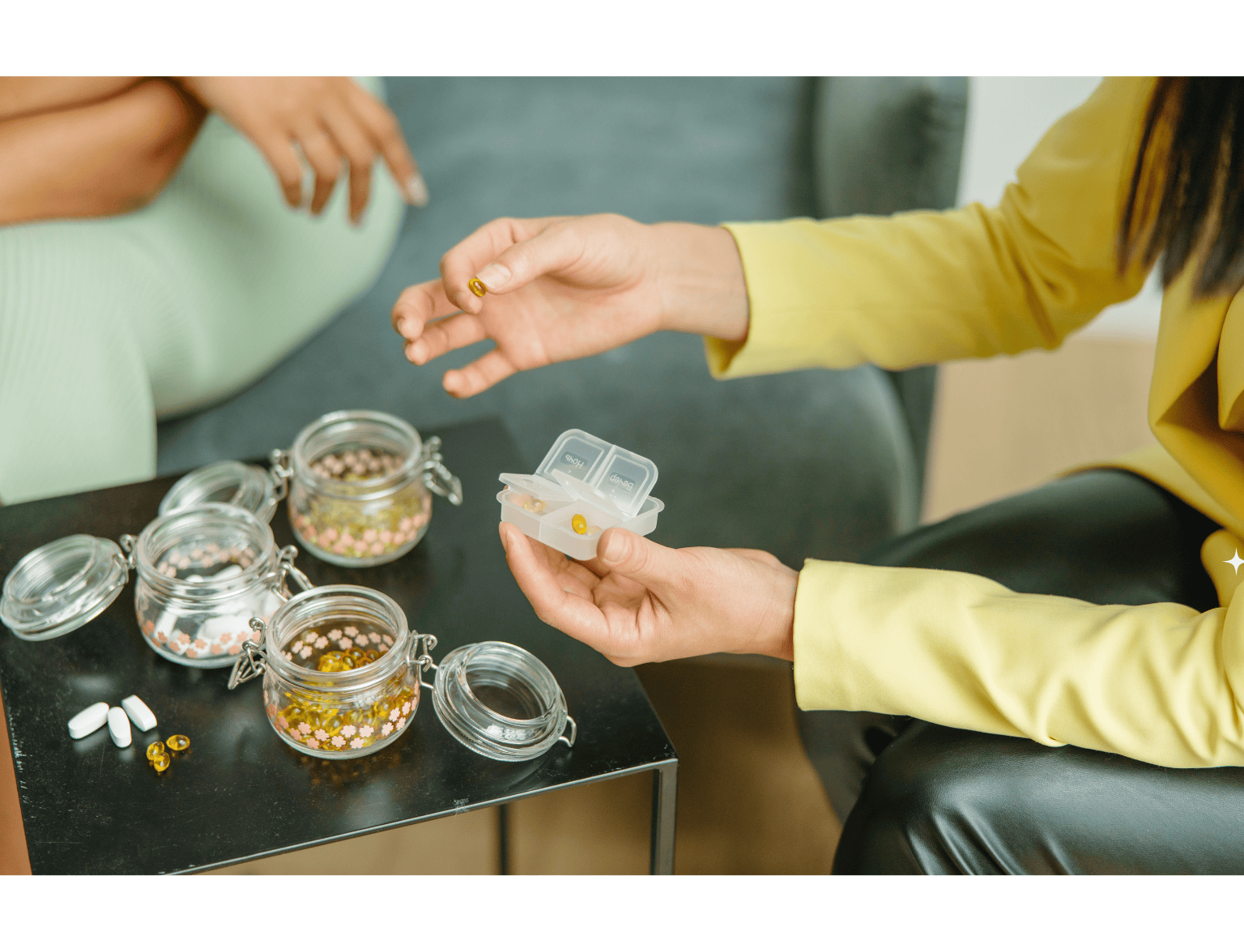You’re standing in the supplement aisle, overwhelmed by rows of bottles promising to boost your mood, reduce anxiety, and fight depression naturally. The labels are compelling: “Clinically studied!” “All natural!” “Fast-acting mood support!” But as someone struggling with depression, anxiety, or other mood disorders, you’re wondering: Do these supplements actually work? Are they safe? And how do you know what’s legitimate versus marketing hype?
If you’ve been exploring alternatives or additions to traditional therapy or medication management with a psychiatrist, you’re not alone. Millions of Americans are turning to nutritional supplements for mental health support, spending billions of dollars annually on products that promise relief from depression, anxiety, ADHD, and other conditions.
The reality is more complex than the marketing suggests. While some supplements show genuine promise backed by research, others are ineffective at best – and potentially dangerous at worst. The Mayo Clinic notes that for some people, some herbal and dietary supplements seem to help with depression. More studies are needed on how well they work and their side effects.
The key lies in understanding which supplements have scientific evidence behind them, what the risks are, and how they might interact with other treatments you’re receiving. Let’s dive into what the research actually shows.
The Supplement Reality Check: Not FDA-Approved Doesn’t Mean Not Effective
Here’s something crucial to understand: The herbal supplement has not been given FDA approval and is considered a dietary supplement. This is true for virtually all mood-supporting supplements. Unlike prescription medications, dietary supplements don’t require FDA approval before hitting the market. This means the quality, purity, and effectiveness can vary dramatically between brands and products.
However, the lack of FDA approval doesn’t automatically mean supplements are ineffective. It simply means they haven’t been through the rigorous testing process required for prescription medications. Some supplements have substantial research backing their use for mood disorders, while others have little to no scientific support.
This regulatory gap creates both opportunities and risks. On the positive side, people can access potentially helpful compounds without a prescription. On the concerning side, there’s less oversight of quality control, dosing accuracy, and safety monitoring compared to prescription medications used in medication management for anxiety or depression.
St. John’s Wort: The Double-Edged Sword
Perhaps no supplement illustrates the complex relationship between natural and pharmaceutical approaches better than St. John’s Wort (Hypericum perforatum). St. John’s wort is effective in alleviating mild to moderate depression; however, careful use is necessary particularly due to possible interactions with other drugs.
The Evidence for St. John’s Wort
Multiple studies have shown that St. John’s Wort can be effective for mild to moderate depression. Some research suggests it may work as well as certain prescription antidepressants for these conditions. St. John’s wort is a medicinal herb that functions as an antidepressant. Some studies show that it can be just as effective as prescription medication.
The Dangerous Side: Drug Interactions
However, this effectiveness comes with significant risks. St. John’s wort can interact with many medications, such as birth control pills, HIV medicines, and heart or transplant drugs, making them less effective. Mixing it with certain foods or drugs can also cause dangerous side effects such as serotonin syndrome or high blood pressure.
These interactions aren’t theoretical – they’re documented and potentially life-threatening. St. John’s Wort can:
- Reduce the effectiveness of birth control pills, leading to unplanned pregnancy
- Interfere with HIV medications, potentially allowing viral replication
- Interact with heart medications, affecting cardiovascular stability
- Cause serotonin syndrome when combined with prescription antidepressants
- Make transplant rejection drugs less effective
Who Should Avoid St. John’s Wort
Also, St. John’s wort is a stimulant and may worsen feelings of anxiety in some people. This is particularly important for individuals with anxiety disorders, panic disorder, or bipolar disorder, where stimulating effects could trigger anxiety attacks or manic episodes.
The bottom line: While St. John’s Wort can be effective for mild depression, it requires careful medical supervision, especially if you’re taking any other medications or have complex mental health conditions.
Omega-3 Fatty Acids: The Most Promising Evidence
Of all the supplements studied for mood disorders, omega-3 fatty acids have some of the strongest research support. Although more studies are needed to determine exactly what role omega-3 fatty acids play in depression, it’s possible that fish oil supplements high in omega-3 fatty acids may lower the risk of depression. And omega-3 fatty acids help protect heart health.
The Science Behind Omega-3s for Mood
There are some epidemiological data emphasizing that people who usually consume a diet with rich content of omega-3-fatty acids are at lower risk of developing major depression, prenatal depression, and bipolar depression. This population-level evidence suggests a protective effect of omega-3s against various forms of depression.
The proposed mechanisms include:
- Inflammation reduction: Depression is often associated with increased inflammation, and omega-3s have powerful anti-inflammatory effects
- Brain structure support: These fatty acids are crucial building blocks for brain cell membranes
- Neurotransmitter regulation: Omega-3s may help optimize serotonin and dopamine function
- Neuroprotection: They may protect against brain cell damage from chronic stress
Dosing and Safety Considerations
Studies suggest they may help manage symptoms of depression and anxiety. Sources: Fatty fish (e.g., salmon, mackerel), walnuts, flaxseeds, or supplements. Recommended Dosage: 1,000–2,000 mg of combined EPA and DHA daily.
However, there are important safety considerations, particularly for people with bipolar disorder. I am more cautious in patients with bipolar depression, because the omega-3s may bring on mania, as can most antidepressants. In these individuals, I recommend using omega-3 cautiously, and preferably in combination with a prescription mood stabilizer.
Mixed Research Results
It’s important to note that research on omega-3s shows mixed results. The review indicates that omega-3 does not prevent depression or anxiety in people without these conditions, reinforcing advice that healthy people do not need to take omega-3. The review found very limited or no evidence of the effect of omega-3 in people with existing depression or anxiety.
This suggests that omega-3s may be most beneficial for people who are already experiencing mood symptoms rather than as a prevention strategy for healthy individuals.
Other Supplements with Research Support
SAMe (S-Adenosyl-L-Methionine)
SAMe is a compound naturally produced by your body that plays a role in neurotransmitter production. Research suggests it may be helpful for depression, with some studies showing effectiveness comparable to certain antidepressants. However, SAMe can interact with medications and may trigger mania in people with bipolar disorder.
Key considerations:
- May work relatively quickly (within 1-2 weeks)
- Can cause stomach upset, insomnia, or anxiety in some people
- Should not be combined with antidepressants without medical supervision
- Expensive compared to other supplement options
B-Complex Vitamins
B vitamins, particularly B6, B9 (folate), and B12, play crucial roles in neurotransmitter production and brain function. Deficiencies in these vitamins are associated with increased risk of depression and anxiety.
Research highlights:
- Folate deficiency is linked to treatment-resistant depression
- B12 deficiency can mimic symptoms of depression and anxiety
- Methylfolate (active form of folate) may enhance antidepressant effectiveness
- Generally safe with few side effects
Vitamin D
Often called the “sunshine vitamin,” vitamin D deficiency is increasingly linked to mood disorders, particularly seasonal affective disorder and depression.
Key points:
- Deficiency is common, especially in northern climates
- Low vitamin D levels correlate with increased depression risk
- Supplementation may help, particularly for people with documented deficiency
- Generally safe, but high doses can cause toxicity
Magnesium
This essential mineral is involved in over 300 bodily processes, including neurotransmitter function and stress response regulation.
Research insights:
- Deficiency is associated with anxiety and depression
- May help with sleep quality and muscle tension
- Generally safe, though high doses can cause digestive issues
- Different forms have varying absorption rates
The Risks: What You Need to Know
Quality Control Issues
Unlike prescription medications, supplements aren’t standardized. A 2018 analysis found that many supplements contained different amounts of active ingredients than listed on labels, and some contained contaminants or unlisted ingredients.
Protection strategies:
- Look for third-party testing (USP, NSF, or ConsumerLab certifications)
- Choose reputable brands with transparency about manufacturing
- Be wary of products making dramatic claims
- Avoid supplements sold through spam emails or questionable websites
Drug Interactions
Many supplements can interact with prescription medications, potentially making them more or less effective. Common interactions include:
- Blood thinners: Omega-3s, garlic, and ginkgo can increase bleeding risk
- Antidepressants: St. John’s Wort, SAMe, and 5-HTP can cause serotonin syndrome
- Bipolar medications: Many supplements can interfere with mood stabilizers
- Diabetes medications: Some supplements affect blood sugar levels
Side Effects and Overdose Risks
“Natural” doesn’t mean “harmless.” Many supplements can cause side effects, especially at high doses:
- St. John’s Wort: Photosensitivity, drug interactions, possible anxiety worsening
- SAMe: Insomnia, anxiety, mania in bipolar disorder
- Omega-3s: Fishy aftertaste, digestive issues, potential bleeding risk
- B vitamins: Generally safe, but high doses of B6 can cause nerve damage
Pregnancy and Nursing Considerations
Many supplements haven’t been adequately tested for safety during pregnancy and breastfeeding. If you’re pregnant, planning to become pregnant, or nursing, consult with healthcare providers before taking any supplements.
Integrating Supplements with Professional Mental Health Care
At NVelUp.care, we understand that many people are interested in exploring both traditional and complementary approaches to mental health. The key is integration rather than substitution – supplements work best when used alongside, not instead of, evidence-based treatments.
Working with Your Treatment Team
If you’re currently receiving therapy or working with a psychiatrist on medication management, it’s crucial to discuss any supplements you’re considering. Your mental health providers need to know about all substances you’re taking to:
- Avoid dangerous interactions
- Monitor for side effects
- Assess whether supplements are helping or hindering your progress
- Adjust prescription medications if needed
Naturopathic Integration
Our naturopathy services can provide expert guidance on supplement selection, dosing, and monitoring. Naturopathic doctors (NDs) are trained in both conventional medicine and natural therapies, making them uniquely qualified to help you navigate supplement options safely.
A qualified ND can:
- Assess your individual needs and health status
- Recommend appropriate supplements based on your specific symptoms
- Monitor for interactions with other treatments
- Adjust recommendations based on your response
- Coordinate care with your other healthcare providers
Complementing Traditional Treatments
Supplements can potentially enhance the effectiveness of traditional mental health treatments:
- With therapy: Certain supplements may improve concentration and emotional regulation, making it easier to engage in therapeutic work
- With medications: Some supplements may reduce side effects or enhance effectiveness of prescription medications
- With lifestyle interventions: Nutritional support can complement exercise, stress management, and sleep hygiene practices
Specific Conditions and Supplement Considerations
Depression
For depression, the supplements with the strongest research support include:
- Omega-3 fatty acids: Particularly EPA-dominant formulations
- SAMe: May work as well as some antidepressants
- Folate/Methylfolate: Especially helpful for treatment-resistant cases
- Vitamin D: Particularly for seasonal depression or documented deficiency
Avoid: St. John’s Wort if taking any prescription medications
Anxiety Disorders
For anxiety, consider:
- Magnesium: May help with physical tension and sleep
- L-theanine: An amino acid that promotes relaxation without sedation
- GABA supplements: Though research is limited on absorption
- Passionflower: Some research supports use for generalized anxiety
Avoid: High doses of B vitamins or stimulating supplements that might increase anxiety
Bipolar Disorder
Bipolar disorder requires extreme caution with supplements:
- Omega-3s: May help with depression phase but use cautiously
- Avoid: St. John’s Wort, SAMe, or any supplement that could trigger mania
- Essential: Always coordinate with your psychiatrist
ADHD
Some supplements show promise for ADHD:
- Omega-3s: May help with attention and hyperactivity
- Magnesium: Often deficient in people with ADHD
- B-complex vitamins: Support neurotransmitter production
- Iron: If deficient, supplementation may help with attention
PTSD
PTSD supplement research is limited, but some options include:
- Omega-3s: May help with inflammation and mood regulation
- Magnesium: For stress response and sleep support
- Vitamin D: If deficient, may support overall mental health
Important: Always work with trauma-informed therapists and consider how supplements might affect your specific trauma responses.
Making Informed Decisions: A Practical Framework
Before Starting Any Supplement:
- Consult with healthcare providers: Especially if you’re taking medications or have complex health conditions
- Research the evidence: Look for peer-reviewed studies, not just testimonials
- Start with one supplement at a time: This helps you assess individual effects
- Choose quality products: Look for third-party testing and reputable manufacturers
- Set realistic expectations: Supplements typically work gradually, not overnight
Red Flags to Avoid:
- Products promising “miracle cures” or dramatic overnight changes
- Supplements sold exclusively through multi-level marketing schemes
- Products with proprietary blends that don’t list individual ingredient amounts
- Supplements making specific medical claims (legally, they can’t)
- Unusually cheap products (may indicate poor quality or contamination)
Monitoring Your Response:
- Keep a mood and symptom journal
- Note any side effects or changes in how you feel
- Track sleep, energy, and appetite changes
- Regular check-ins with healthcare providers
- Be patient – most supplements take weeks to show effects
The Bottom Line: Supplements as Tools, Not Magic Bullets
The research on supplements for mood disorders is promising but complex. Some supplements, particularly omega-3 fatty acids, have substantial evidence supporting their use as complementary treatments for depression and anxiety. Others, like St. John’s Wort, can be effective but carry significant risks that require careful medical supervision.
What’s clear is that supplements are tools – potentially valuable ones – but they’re not replacements for comprehensive mental health care. For some people, some herbal and dietary supplements seem to help with depression. More studies are needed on how well they work and their side effects.
The most effective approach to mental health typically involves multiple strategies working together:
- Evidence-based therapy approaches
- Appropriate medication when needed
- Lifestyle interventions (exercise, sleep, nutrition)
- Social support and stress management
- Carefully selected supplements under professional guidance
Remember, mental health conditions are complex, involving genetics, brain chemistry, life experiences, and environmental factors. While supplements can be valuable additions to your mental health toolkit, they work best as part of a comprehensive, professionally guided approach to wellness.
Your Path Forward: Getting Professional Guidance
If you’re struggling with depression, anxiety, or other mood disorders, you don’t have to navigate supplement decisions alone. The interaction between nutritional supplements and mental health is complex, requiring expertise that considers your individual health status, current treatments, and specific symptoms.
At NVelUp.care, our comprehensive approach to mental health includes understanding how nutritional factors, including supplements, can support your overall wellness journey. Our team of psychiatrists, therapists, and naturopathic doctors can help you develop a personalized approach that safely integrates evidence-based supplements with traditional mental health treatments.
Whether you’re seeking therapy for depression, working with a psychiatrist on medication management for anxiety, or exploring naturopathy approaches that include nutritional support, we’re here to provide the expert guidance you need.
Our integrated services serve residents throughout Washington, Idaho, New Mexico, and Utah, offering both in-person and online options to make quality mental health care accessible and convenient. Don’t let confusion about supplements delay your path to better mental health – get the professional support you deserve.
Ready to explore how the right combination of treatments, including carefully selected supplements, can support your mental wellness journey? Visit our website at https://nvelup.care to learn more about our comprehensive approach to mental health and take the first step toward feeling better safely and effectively.







